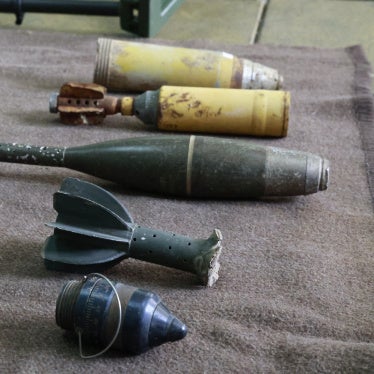(Bangkok) – The new use of landmines in a handful of countries threatens to undermine progress toward banning the weapons, Human Rights Watch said today at the launch of Landmine Monitor 2011, a global report released in Bangkok. The membership in the international treaty banning antipersonnel landmines has expanded, however, to 158 countries.
“New use of landmines is the exception and not the norm, but the world should condemn any use of this brutal weapon,” said Mary Wareham of Human Rights Watch, a member of the Landmine Monitor 2011 editing team. “The vast majority of the world’s nations have sworn off using antipersonnel mines and are abiding by the Mine Ban Treaty, but a handful still buck this trend.”
At least three governments have laid new antipersonnel mines in 2011: Israel; Libya, under the former government of Muammar Gaddafi; and Burma. After Landmine Monitor 2011 went to print in early October, media reported that Syria had laid new mines on its borders with Lebanon and Jordan, but the Landmine Monitor has not yet been able to verify these reports. None of these states have joined the 1997 Mine Ban Treaty, which comprehensively prohibits antipersonnel mines. Landmine Monitor 2011 says that non-state armed groups in Afghanistan, Colombia, Burma, and Pakistan used antipersonnel mines recently as well.
The report by the International Campaign to Ban Landmines (ICBL) was issued ahead of the Mine Ban Treaty’s Eleventh Meeting of States Parties, scheduled for November 28 to December 2 in Phnom Penh. Human Rights Watch is a co-founder of the campaign, recipient of the Nobel Peace Prize in 1997, and took the lead in establishing the campaign’s Landmine Monitor initiative in 1999.
“The Mine Ban Treaty has proven itself to be one of the great success stories in disarmament and in broader global humanitarian efforts, but major challenges remain,” Wareham said. “All nations need to make a commitment to the ban treaty and work to end the suffering and casualties caused by this weapon.”
The most recent countries to join the treaty include the world’s newest state, South Sudan, on November 11, and the Pacific island nation of Tuvalu, on September 13. Several more states are planning to complete the process by 2012, including Finland and Poland, while a US policy review on joining the treaty appeared to slow without concluding in 2011. These countries are expected to attend the Cambodia meeting, as well as other countries that have not yet signed, including China, Lao PDR, Lebanon, Libya, and Vietnam.
Landmine Monitor 2011 details progress made in implementing the Mine Ban Treaty as well as measures by nations that have not joined. Major findings include:
- A total of 87 states have completed the destruction of their landmine stockpiles, but four treaty members remain in violation of the treaty’s obligation to destroy their stockpiles of antipersonnel mines within four years of joining: Belarus, Greece, Turkey, and Ukraine;
- Twelve countries are identified by the Monitor as producers of antipersonnel mines: China, Cuba, India, Iran, Myanmar, North Korea, Pakistan, Russia, Singapore, South Korea, the United States, and Vietnam;
- There were 4,191 new landmine and explosive remnants of war casualties in 2010, but the true figure is certainly higher as casualty data remain poor and incomplete in some countries;
- At least 200 square kilometers of land was cleared of landmines during 2010 – the highest annual total recorded by the Monitor – resulting in the destruction of more than 388,000 antipersonnel mines and 27,000 antivehicle mines.
- Five countries – Afghanistan, Cambodia, Croatia, Iraq, and Sri Lanka – accounted for more than 80 percent of all mine clearance.








